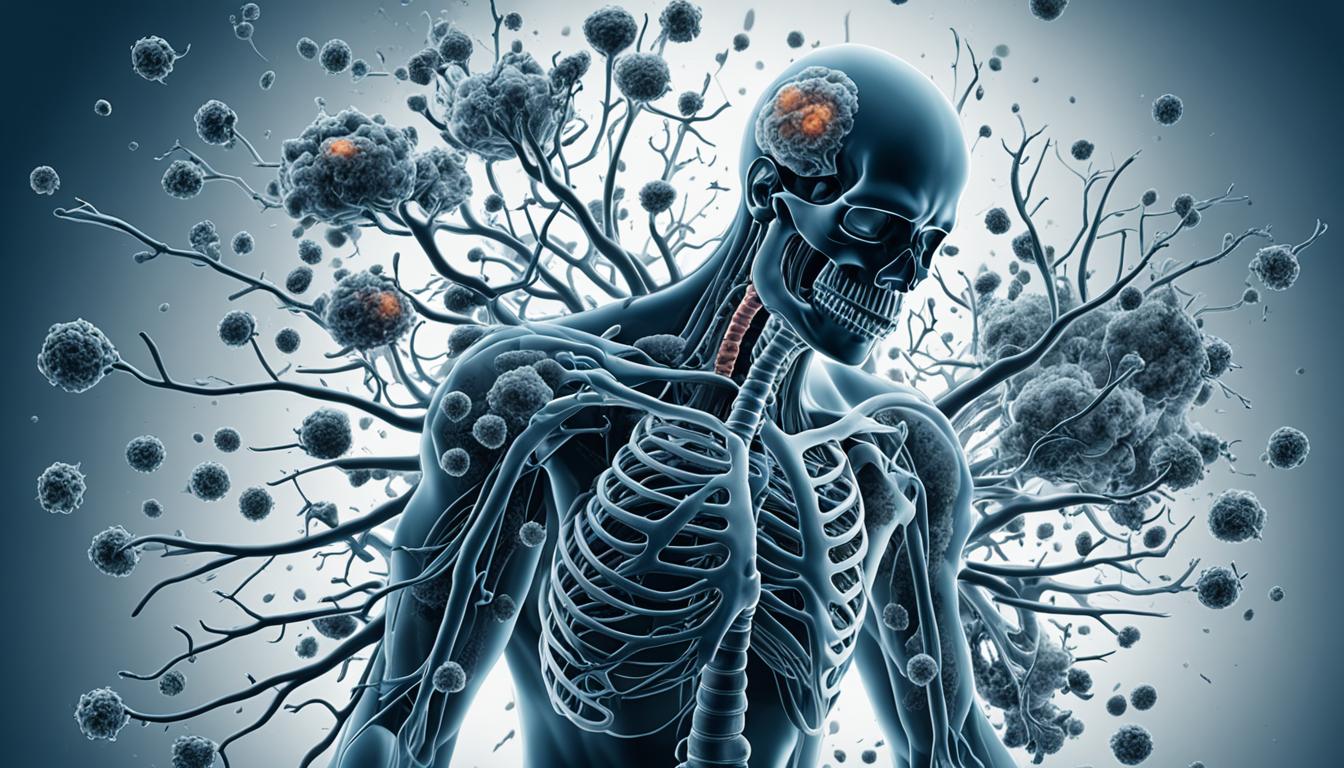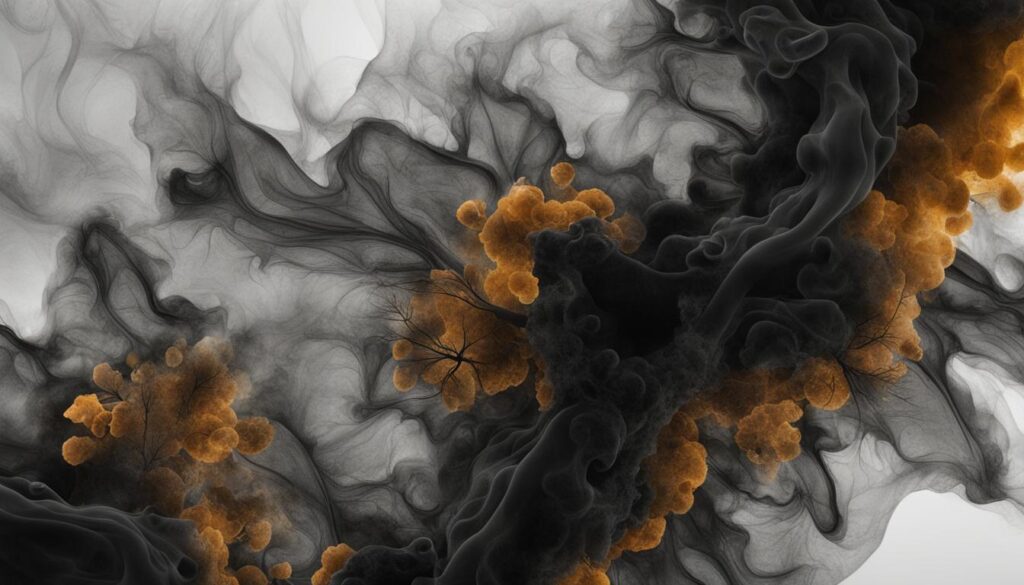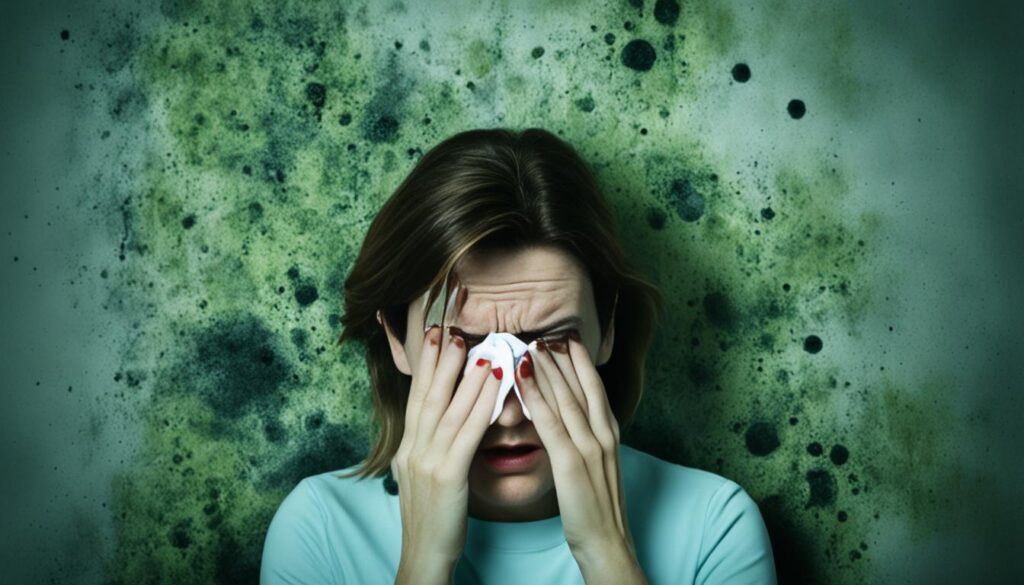
Black Mold Exposure Symptoms and Health Risks
Black mold exposure can have significant consequences on our health. It is important to be aware of the symptoms associated with black mold to ensure better indoor air quality and prevent potential health issues.
Key Takeaways:
- Black mold exposure can lead to various respiratory symptoms such as coughing, wheezing, shortness of breath, and nasal congestion.
- Individuals may develop allergic reactions to black mold, presenting symptoms like itchy eyes, sneezing, skin rashes, and allergic rhinitis.
- Neurological and cognitive symptoms including headaches, dizziness, memory problems, difficulty concentrating, and mood swings can be linked to black mold exposure.
- Other health effects of black mold exposure may include fatigue, muscle aches, digestive issues, and immune system suppression.
- If you suspect black mold exposure based on these symptoms, it is crucial to seek professional help to improve your indoor air quality.
Understanding Black Mold and Its Impact
Before we delve into the symptoms, let’s understand what black mold is and how it can affect our health. This section will provide an overview of black mold and its potential impact on our well-being.
Black mold, scientifically known as Stachybotrys chartarum, is a type of toxic fungi that thrives in damp, humid environments. It can often be found in areas with water damage, such as leaky roofs, plumbing issues, or flooded basements.
Did you know? Black mold is characterized by its dark greenish-black appearance and a slimy texture. It usually has a distinct musty odor, which can help in identifying its presence.
When black mold spores are released into the air and inhaled, they can lead to a range of health problems. The toxic compounds present in black mold can cause mold toxicity symptoms and mold poisoning symptoms in individuals who are sensitive or exposed to high levels of mold for prolonged periods.
The Impact of Black Mold
Exposure to black mold can have significant effects on both physical and mental health. It is important to be aware of these effects to protect ourselves and our loved ones from potential harm.
The effects of black mold exposure can vary from person to person, depending on several factors such as the individual’s sensitivity, the duration of exposure, and the concentration of mold in the environment.
The most common health effects associated with black mold exposure include:
- Respiratory issues such as coughing, wheezing, shortness of breath, and nasal congestion.
- Allergic reactions such as itchy eyes, sneezing, skin rashes, and allergic rhinitis.
- Neurological symptoms like headaches, dizziness, memory problems, difficulty concentrating, and mood swings.
- Other health effects such as fatigue, muscle aches, digestive issues, and immune system suppression.
It is important to note that some individuals may be more susceptible to the effects of black mold than others. People with weakened immune systems, respiratory conditions, or pre-existing allergies may experience more severe symptoms.
Now that we have an understanding of black mold and its potential impact, let’s proceed to the next section to explore the specific respiratory symptoms associated with black mold exposure.
| Effects of Black Mold Exposure | Common Symptoms |
|---|---|
| Respiratory Issues | Coughing, wheezing, shortness of breath, nasal congestion |
| Allergic Reactions | Itchy eyes, sneezing, skin rashes, allergic rhinitis |
| Neurological Symptoms | Headaches, dizziness, memory problems, difficulty concentrating, mood swings |
| Other Health Effects | Fatigue, muscle aches, digestive issues, immune system suppression |
Respiratory Symptoms of Black Mold Exposure
Exposure to black mold can have detrimental effects on the respiratory system. It is important to be aware of the common symptoms that may indicate black mold exposure. These symptoms include:
- Coughing
- Wheezing
- Shortness of breath
- Nasal congestion
If you experience any of these respiratory symptoms, it is crucial to consider the possibility of black mold exposure and take appropriate action to address the issue.
Black mold can release spores into the air, which can be inhaled and cause irritation in the respiratory tract. This irritation can lead to the above-mentioned symptoms. It is important to note that individuals with pre-existing respiratory conditions, such as asthma or allergies, may be more susceptible to these symptoms when exposed to black mold.

It is vital to address black mold exposure promptly to prevent further respiratory complications. Seeking professional help for mold assessment and remediation, like Fix Mold Miami, can assist in improving indoor air quality and reducing the risk of respiratory symptoms caused by black mold.
Allergic Reactions to Black Mold
Exposure to black mold can trigger allergic reactions in some individuals. These reactions are the body’s immune response to the presence of mold spores in the environment. Allergic symptoms can vary in severity and may include:
- Itchy eyes: Black mold spores can irritate the eyes, leading to itching, redness, and watery discharge.
- Sneezing: Mold spores inhaled through the nose can stimulate sneezing as the body tries to expel the irritants.
- Skin rashes: Direct contact with black mold can cause skin rashes, hives, or itching.
- Allergic rhinitis: Persistent nasal congestion, runny nose, and post-nasal drip may be signs of allergic rhinitis caused by black mold exposure.
Allergic reactions to black mold can be uncomfortable and interfere with daily activities. If you experience these symptoms and suspect black mold exposure, it is important to seek professional help for proper assessment and remediation.

| Allergic Reactions to Black Mold | |
|---|---|
| Itchy eyes | ✔ |
| Sneezing | ✔ |
| Skin rashes | ✔ |
| Allergic rhinitis | ✔ |
Neurological and Cognitive Symptoms
Exposure to black mold can have significant effects on our neurological and cognitive health. The presence of black mold in indoor environments has been linked to a variety of symptoms that can impact our daily lives.
One common symptom associated with black mold exposure is frequent headaches.
These headaches can range from mild to severe and may be accompanied by other symptoms such as dizziness and difficulty concentrating.
“I started experiencing intense headaches and dizziness when I was in my apartment. It was affecting my ability to focus and perform well at work,” shared Emily, a young professional who discovered black mold contamination in her living space.
Individuals exposed to black mold may also experience memory problems and cognitive difficulties. This can manifest as forgetfulness, difficulty recalling information, and reduced mental clarity.
“I noticed that my memory was starting to decline, and I was having trouble staying focused on tasks,” said Richard, a middle-aged individual who discovered black mold growth in his basement.
Mood swings are another neurological and cognitive symptom associated with black mold exposure. People may experience sudden changes in mood, including irritability, anxiety, or depression.
It is crucial to recognize these neurological and cognitive symptoms as they can significantly impact our quality of life. Seeking professional help for black mold assessment and remediation can aid in reducing these symptoms and improving overall well-being.
Here is a table summarizing the neurological and cognitive symptoms of black mold exposure:
| Neurological and Cognitive Symptoms |
|---|
| Headaches |
| Dizziness |
| Memory problems |
| Difficulty concentrating |
| Mood swings |
Other Health Effects of Black Mold Exposure
Apart from respiratory, allergic, and neurological symptoms, exposure to black mold can have other health effects. These effects can vary from person to person and depend on factors such as the duration and intensity of exposure, individual susceptibility, and overall health. It is essential to be aware of these potential health effects to take appropriate measures and seek timely assistance.
Fatigue
One common symptom that individuals may experience as a result of black mold exposure is fatigue. Persistent fatigue and lack of energy can significantly impact daily life and productivity. If you notice unexplained tiredness even after getting adequate rest, it may be worth considering black mold as a possible cause.
Muscle Aches
Exposure to black mold can also lead to muscle aches and pains in some individuals. These discomforts can manifest as general muscle soreness, joint stiffness, or specific localized pain. If you experience muscle aches without any apparent cause or injury, it is advisable to investigate potential mold exposure.
Digestive Issues
Symptoms such as nausea, vomiting, diarrhea, and abdominal pain can occur as a result of black mold exposure. These digestive issues may not be directly visible or attributed to mold at first, but if they persist or recur without any other plausible explanation, it’s vital to consider the possibility of mold-related health effects.
Immune System Suppression
Black mold exposure can weaken the immune system, making individuals more susceptible to infections and illnesses. If you find yourself frequently falling sick or experiencing prolonged recovery periods, it may be worth exploring the connection between your compromised immune system and potential mold exposure.
It is important to note that these health effects may overlap with symptoms of other medical conditions. Therefore, it is crucial to consult with a healthcare professional for a proper diagnosis. Additionally, addressing the underlying mold issue in your living or working environment is essential to mitigate further health risks.
Exposure to black mold can lead to various health effects, including fatigue, muscle aches, digestive issues, and immune system suppression.
To learn more about the health effects of black mold exposure and how to address the issue effectively, continue reading the next section.
Seeking Professional Help and Prevention
If you suspect black mold exposure based on the symptoms discussed, it is important to seek professional help. Addressing mold-related issues promptly can significantly mitigate potential health risks and prevent further damage to your property. When it comes to mold assessment and remediation services, it’s crucial to choose a reputable and experienced company like Fix Mold Miami. They specialize in providing comprehensive solutions for black mold and ensuring optimal indoor air quality.
Why Choose Fix Mold Miami?
Fix Mold Miami is committed to delivering top-notch services and customer satisfaction. Here are some reasons why they should be your go-to mold assessment and remediation experts:
- Expertise: Fix Mold Miami has a team of highly skilled professionals who are knowledgeable about black mold exposure symptoms and the necessary steps for effective mold removal.
- Advanced Equipment: They utilize state-of-the-art equipment and technology to accurately assess the mold situation in your property and perform efficient remediation.
- Thorough Assessment: Fix Mold Miami conducts comprehensive inspections to identify the extent of mold contamination and the underlying causes, ensuring a targeted and effective remediation plan.
- Safe and Efficient Remediation: Their team follows industry best practices to safely remove black mold and restore your property to a clean and healthy environment.
- Prevention Strategies: Fix Mold Miami also provides guidance on preventive measures to minimize the risk of future mold growth, helping you maintain a mold-free home or workplace.
Remember, addressing black mold issues should always be entrusted to professionals. Attempting DIY solutions can be risky and may lead to inadequate remediation, resulting in recurring mold growth and potential health hazards. Contact Fix Mold Miami at 305-465-6653 to schedule a consultation and protect your indoor air quality.
Conclusion
In conclusion, it is vital to be aware of the symptoms of black mold exposure for the sake of maintaining a healthy indoor environment. The potential health risks associated with black mold can have serious consequences, which is why taking necessary precautions and seeking appropriate assistance is so important.
By recognizing the signs of black mold exposure, such as respiratory issues, allergic reactions, neurological symptoms, and other health effects, you can protect yourself and your loved ones. If you experience black mold symptoms like coughing, wheezing, itchy eyes, headaches, or fatigue, it is crucial to reach out for professional help promptly.
To ensure the highest quality mold assessments, prevention, and remediation services, contact Fix Mold Miami at 305-465-6653. Their team of experts can help you address any black mold concerns and improve the indoor air quality of your property. Taking proactive measures today can lead to a healthier and safer living environment tomorrow.




